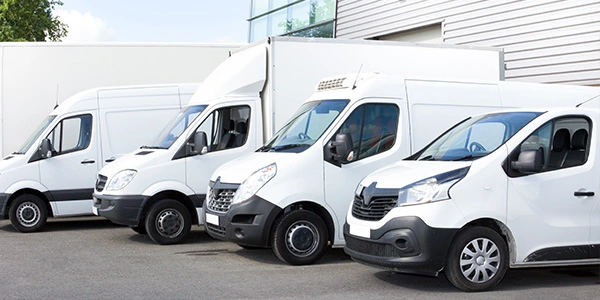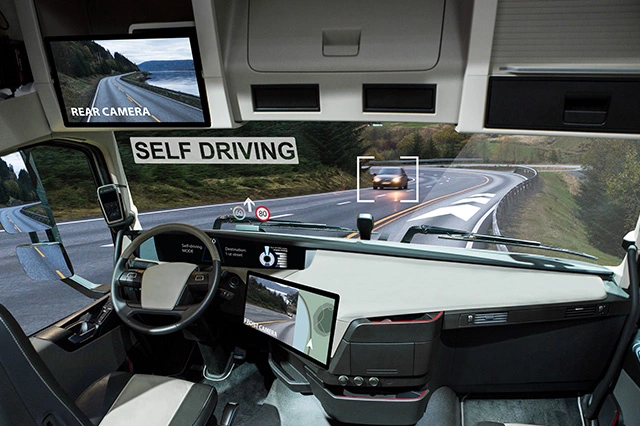What is Fleet Insurance?
Fleet insurance is a single commercial insurance policy that insures a number of vehicles. It’s designed for businesses or organisations that operate a number of vehicles such as cars, vans or HGVs, allowing you to cover all your vehicles under a single policy.
Instead of purchasing separate insurance policies for each vehicle, a motor fleet policy allows the owner or operator to insure all vehicles under a single policy.
Fleet policies will provide protection for the business against potential financial losses resulting from accidents, theft, or other unexpected events involving the listed vehicles.
How our process works
We’ve worked hard to refine our process and keep it as quick, easy and simple as possible for our customers.
How Does Motor Fleet Insurance Work?
Motor fleet insurance is designed to provide coverage for businesses that operate multiple vehicles. Instead of insuring each vehicle individually, a motor fleet insurance policy allows businesses to cover all their vehicles under one policy. This simplifies management and can be more cost-effective.
Like car insurance, you will start off by picking from one of the below levels of cover.
- Third-Party Only (TPO) : This is the minimum level of insurance required in the UK and provides cover for any damage or injury caused to third parties through fault of your driver.
- Third-Party Fire and Theft (TPFT) : This provides the same coverage as TPO but also includes cover for fire and theft of the insured vehicles.
- Comprehensive: This provides cover for damage to the insured vehicles, as well as third-party damage, fire, and theft.
Once you have chosen your basic level of cover, you can then select from a number of additional addons to supplement your policy.
It’s important to carefully review the specific terms and conditions of a fleet insurance policy, as cover can vary widely. When obtaining quotes, you will be able to customise your policy to ensure that it fits your individual needs.
What Types Of Vehicles Can Be Covered Under A Fleet Insurance Policy?
Fleet insurance can cover a wide range of vehicles. The specific types of vehicle that can be covered will depend on the insurance provider and the policy terms. Commonly though, you will find the below on a fleet policy.
- Cars – including sedans, hatchbacks, and estates
- Vans – including panel vans, trucks, and refrigerated vans
- Lorries – including flatbeds, box trucks, and artic lorries
- Buses – including minibuses and coaches
- Taxis – including black cabs, private hire cars, and minicabs
- Construction vehicles – including bulldozers, cranes, and excavators
- Delivery vehicles – including courier vans and trucks
- Emergency service vehicles – including police cars, ambulances, and fire engines
- Trailers – including cargo and flatbed trailers
- Farm vehicles – including tractors, combine harvesters, and balers.
Typically, fleet insurance policies will cover vehicles that are used for business purposes, such as transportation of goods, employees, or customers. The vehicles can be owned by the business or can be leased or rented.
The policy can also cover a mix of vehicle types, such as cars and vans, or different makes and models.
It’s important to note that some insurance providers may have restrictions on the types of vehicles that can be covered under a fleet insurance policy. For example, some providers may not cover vehicles that are over a certain age or that have certain modifications or customizations.
How Many Vehicles Do I Need To Have To Qualify For Fleet Insurance?
Most insurance brokers will quote you a fleet policy when you have two or more vehicles. That said, we can help with those looking for 2 vehicle fleet policies.
If you only have the one vehicle, you will need to insure it on it’s own until you have more vehicles to insure additionally. For more on common single vehicle policies, please visit our van courier, HGV or single van insurance pages.
Can I Add Or Remove Vehicles From My Fleet Insurance Policy?
Yes, fleet policies are versatile policies and will allow the adding and removing of vehicles. Having a single renewal date for all vehicles can simplify the insurance process for businesses.
When adding a vehicle, you will need all the vehicle details such as make, model and registration number. The same applies when adding a driver to your policy. To add a driver, you will need the drivers licence and driving history.
Changes to your policy are likely to incur an admin fee and may result in a change of premium. For instance, if you add 2 high value vans, the risk is greater and therefore an adjustment in premium will be required.
How Much Does Fleet Insurance Cost?
The cost of motor fleet insurance can vary widely depending on a number of factors. This will include the number and type of vehicles in the fleet and the level of cover required. Then there is the driving history and experience of the drivers and the location of the business.
As a general rule, the larger the fleet, the lower the cost per vehicle. However, other factors such as the age and condition of the vehicles, the driving record of the drivers, and the type of business can also affect the cost of the policy.
What Factors Affect The Cost Of Fleet Insurance?
The cost of fleet insurance can be affected by a variety of factors, including:
- The number of vehicles in the fleet: Generally, the more vehicles in the fleet, the higher the cost of insurance. However, the cost per vehicle is typically lower.
- The type of vehicles in the fleet: Some types of vehicle, such as high-performance cars or high risk commercial vehicles, may be more expensive to insure than others.
- The level of cover required: Comprehensive cover will generally be more expensive than third-party only or third-party fire and theft.
- The age and experience of the drivers: Young or inexperienced drivers may be considered higher risk and may result in higher insurance premiums. Opting for an any driver fleet insurance policy will also increase the cost.
- The excess amount: A higher excess amount can reduce insurance premiums but may result in higher out-of-pocket expenses in the event of a claim.
- Additional options: Additional cover options, such as windscreen repair or replacement, breakdown assistance, and legal expenses, can increase the cost of insurance.
- The insurance provider and policy terms: Different insurance providers may have different pricing structures and policy terms. Therefore, it’s recommended to compare multiple quotes before selecting a policy.
Just like with motor insurance, shopping around for the best deals annually can help you save on fleet insurance costs.
Are There Any Discounts Available On Fleet Insurance Quotes?
There may be discounts available for fleet insurance, depending on the insurance provider and the specific policy terms. Some common types of discounts that may be available include:
- Multi-vehicle discount: This is a discount that is typically offered when insuring a larger number of vehicles. The discount amount may increase as the number of vehicles insured under the policy increases.
- No-claims discount: This is a discount that is typically offered to policyholders who have not made any claims during the policy period. The discount amount can vary depending on the insurance provider and the length of time without a claim.
- Driver training discount: This is a discount that is typically offered to policyholders who provide evidence that their drivers have completed an approved driver training program.
- Telematics discount: This is a discount that is typically offered to policyholders who install telematics devices in their vehicles. Telematics will monitor the drivers behaviour and promote safe driving practices. It is very common for taxi fleet, courier fleet and lorry fleet insurance.
What Is The Difference Between ‘Fleet’ and ‘Mini Fleet’ Insurance?
In essence, there is nothing different to the level of cover or cover options for ‘fleet’ and ‘mini fleet’ insurance. What is different is the anticipated size of the fleet.
When a potential customer is asking for mini fleet insurance, it is expected that they will generally have 3 to 10 vehicles. Mini fleet insurance quotes are usually requested by small company fleet owners or fledging courier fleets. That said, anyone with a small fleet can request ‘mini fleet insurance’.
Frequently Asked Questions
Related News
Green Haulage in the UK: Paving the Way for a Sustainable Future
The United Kingdom is at a crossroads in its transportation and logistics industry, particularly in the sector of haulage, where the push towards greener, more sustainable practices is not just a matter of regulatory
The Benefits of Telematics Insurance: A Comprehensive Guide
Telematics insurance, also known as black box insurance, is revolutionising the way individuals and businesses manage their vehicle operations. By leveraging technology that monitors driving behaviour and vehicle usage, telematics insurance offers a range
Telematics. How Does It Work and What Are The Benefits?
Vehicle telematics is a multifaceted technology that integrates telecommunications and informatics to provide a variety of functions and services in vehicles. It's primarily used for monitoring vehicle location, movements, status, and behaviour. Telematics technology





